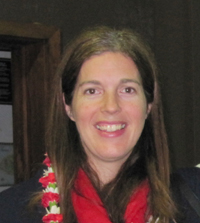Leslie B. Vosshall
Leslie B. Vosshall is a prominent neuroscientist and geneticist known for her significant contributions to the understanding of the molecular and neural basis of olfaction, or the sense of smell. Vosshall is particularly renowned for her work on the olfactory system of Drosophila melanogaster, commonly known as the fruit fly, which has provided deep insights into how organisms perceive and process odors.
Early Life and Education[edit | edit source]
Leslie B. Vosshall was born in 1965. From a young age, she showed a keen interest in the sciences. She pursued her undergraduate studies at Columbia University, where she majored in Biochemistry. After completing her bachelor's degree, Vosshall continued her education at Rockefeller University, where she earned her Ph.D. in Neuroscience. Her doctoral work laid the foundation for her future research in olfaction and sensory perception.
Career and Research[edit | edit source]
After completing her Ph.D., Vosshall conducted postdoctoral research, further honing her expertise in molecular genetics and neurobiology. She then joined the faculty at Rockefeller University, where she has been a key figure in the neuroscience and genetics departments.
Vosshall's research has been groundbreaking in elucidating how the olfactory system functions at both the molecular and behavioral levels. One of her most notable discoveries was the identification of the Or83b gene in fruit flies, which is crucial for olfactory receptor function. This discovery has had profound implications for understanding how smells are detected and processed in the brain.
Beyond her work with fruit flies, Vosshall has also conducted significant research on the olfactory systems of humans and other animals. Her studies have explored the genetic and neural mechanisms underlying variations in odor perception among individuals, contributing to the broader field of sensory neuroscience.
Awards and Honors[edit | edit source]
Leslie B. Vosshall has received numerous awards and honors in recognition of her contributions to science. These accolades underscore her role as a leading figure in the study of olfaction and sensory neuroscience.
Impact and Legacy[edit | edit source]
Vosshall's research has not only advanced our understanding of the olfactory system but has also had implications for the study of behavior, evolution, and neural circuitry. Her work exemplifies the power of using model organisms, like the fruit fly, to unravel complex biological processes that are relevant across species.
Selected Publications[edit | edit source]
Throughout her career, Vosshall has authored numerous influential research papers and articles. Her publications are highly regarded in the fields of genetics, neuroscience, and olfaction.
Personal Life[edit | edit source]
In addition to her scientific endeavors, Vosshall is an advocate for diversity and inclusion in the sciences. She has been involved in various initiatives aimed at supporting underrepresented groups in STEM fields.
Search WikiMD
Ad.Tired of being Overweight? Try W8MD's physician weight loss program.
Semaglutide (Ozempic / Wegovy and Tirzepatide (Mounjaro / Zepbound) available.
Advertise on WikiMD
|
WikiMD's Wellness Encyclopedia |
| Let Food Be Thy Medicine Medicine Thy Food - Hippocrates |
Translate this page: - East Asian
中文,
日本,
한국어,
South Asian
हिन्दी,
தமிழ்,
తెలుగు,
Urdu,
ಕನ್ನಡ,
Southeast Asian
Indonesian,
Vietnamese,
Thai,
မြန်မာဘာသာ,
বাংলা
European
español,
Deutsch,
français,
Greek,
português do Brasil,
polski,
română,
русский,
Nederlands,
norsk,
svenska,
suomi,
Italian
Middle Eastern & African
عربى,
Turkish,
Persian,
Hebrew,
Afrikaans,
isiZulu,
Kiswahili,
Other
Bulgarian,
Hungarian,
Czech,
Swedish,
മലയാളം,
मराठी,
ਪੰਜਾਬੀ,
ગુજરાતી,
Portuguese,
Ukrainian
Medical Disclaimer: WikiMD is not a substitute for professional medical advice. The information on WikiMD is provided as an information resource only, may be incorrect, outdated or misleading, and is not to be used or relied on for any diagnostic or treatment purposes. Please consult your health care provider before making any healthcare decisions or for guidance about a specific medical condition. WikiMD expressly disclaims responsibility, and shall have no liability, for any damages, loss, injury, or liability whatsoever suffered as a result of your reliance on the information contained in this site. By visiting this site you agree to the foregoing terms and conditions, which may from time to time be changed or supplemented by WikiMD. If you do not agree to the foregoing terms and conditions, you should not enter or use this site. See full disclaimer.
Credits:Most images are courtesy of Wikimedia commons, and templates Wikipedia, licensed under CC BY SA or similar.
Contributors: Prab R. Tumpati, MD

